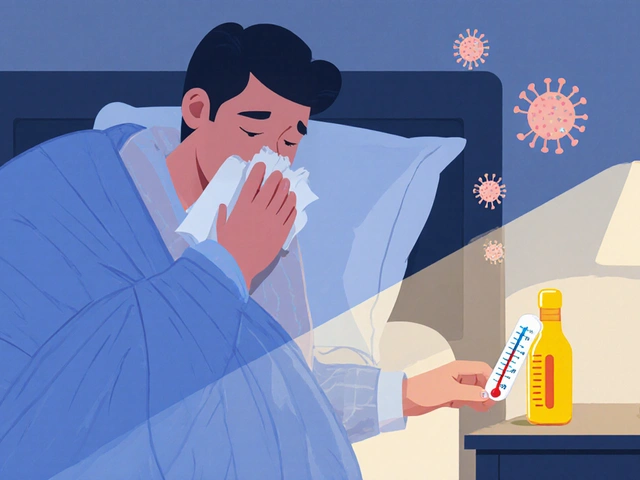Cough management: clear steps that actually help
A cough can be useful — it clears mucus and protects your lungs — but when it nags you day and night, you want answers. This guide gives simple, practical fixes you can try at home, explains the difference between wet and dry coughs, and tells you when to see a clinician. No jargon, just straightforward help.
Quick home fixes that work
Start with the basics: drink warm fluids, steam, and rest your voice. Warm tea or broth soothes the throat and thins mucus. A humidifier or a hot shower can loosen phlegm if the air at home is dry. Honey (a spoonful for adults and kids over 1 year) often eases nighttime coughing better than nothing.
Lozenges or hard candy help if your cough is from throat irritation or postnasal drip. If mucus is thick, try gentle saline nasal rinses or nasal sprays to clear sinuses — that can stop the drip that triggers coughing. And if you smoke, quitting is the single most effective step to reduce chronic cough.
OTC options and when they help
Know your cough: a dry, hacking cough may respond to a cough suppressant like dextromethorphan, while a wet cough that brings up mucus may be helped by an expectorant such as guaifenesin to make sputum easier to cough up. These medicines help symptoms but won’t fix an infection by themselves.
Avoid giving adult cough medicines to young children — kids under 4 should not get many OTC cough-and-cold formulas. Also, antibiotics only help if a doctor finds a bacterial infection. Most coughs come from viruses, asthma, reflux, or medication side effects and don’t need antibiotics.
For wheeze or suspected asthma, bronchodilators (inhalers) or steroid inhalers prescribed by a doctor can quickly reduce coughing and breathlessness. If you have allergies, antihistamines and nasal sprays reduce postnasal drip and related coughs.
When to see a doctor
Get medical help right away if coughing comes with high fever, difficulty breathing, blue lips, coughing up blood, or fainting. See a doctor within a few days if your cough lasts more than 2–3 weeks, wakes you up at night, or keeps getting worse despite home care.
Chronic cough (often defined as longer than 8 weeks in adults) often traces to asthma, gastroesophageal reflux, chronic bronchitis, or ACE inhibitor medication. Your clinician may order a chest X-ray, lung function tests, or try stopping a suspected drug to find the cause.
For babies and young children, don’t wait: seek care for fast breathing, poor feeding, dehydration, persistent high fever, or if the child looks very sick. Pediatric coughs can escalate quickly.
Coughs are usually manageable at home, but they can also signal something treatable that needs a doctor. Use these steps to feel better fast, and don’t hesitate to get help when red flags show up.

The role of hydration in managing a cough
As a blogger, I've recently been researching the importance of hydration in managing a cough. I've discovered that staying well-hydrated is crucial for thinning mucus in the airways, making it easier to expel and reducing cough severity. Drinking warm liquids, like tea or broth, can provide additional relief by soothing an irritated throat. Additionally, using a humidifier to maintain optimal indoor humidity levels can help prevent dryness, which may contribute to coughing. Overall, proper hydration plays a vital role in managing a cough and can significantly improve our overall well-being.
View More



